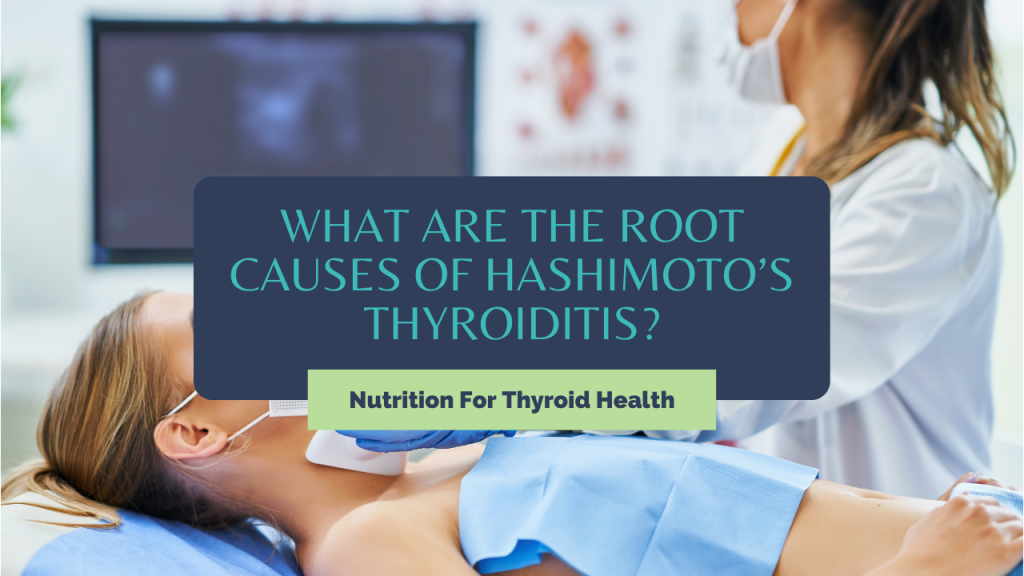What are the Root Causes of Hashimoto’s Thyroiditis?
Hashimoto’s disease is an autoimmune condition where your immune system attacks your thyroid. The condition causes chronic inflammation, and it is the most common cause of an underactive thyroid.
The first things you may notice are symptoms like fatigue, anxiety, and even depression – long before the diagnosis. But what causes Hashimoto’s thyroiditis? In this blog, I want to take a closer look at six of the root causes of this disease.
- Gut Health 1: Gluten Sensitivity
- Epstein-Barr Virus
- Stress
- Gut Health 2: H. pylori
- Gut Health 3: SIBO
- Nutrient Deficiencies
Gluten Sensitivity
Gluten sensitivity is not the same as celiac disease where your body can’t break down gluten at all, but you may have similar symptoms. Those symptoms can be connected to your thyroid. Reducing your gluten intake allows you to see whether your symptoms clear up as well.
It’s simple: if gluten is causing inflammation in your body, it may also cause an autoimmune condition like Hashimoto’s to flare up.
Epstein-Barr Virus (EBV)
Most of us remember EBV as the cause of the common childhood illness mononucleosis or mono. It’s a type of herpes virus, and experts estimate that 80% of adults carry the virus in its dormant form.
However, if it is reactivated by food, illness, or another stressor, it can lead to other problems. You may not notice it, but you may be carrying a low-level EBV infection, making you more likely to develop an autoimmune condition.
Stress
It’s impossible to talk about thyroid conditions without talking about stress. We have become so used to being stressed that we’re almost considering stress to be normal. But remember stress affects us physiologically, too. Consider rushing through traffic to pick up your kids when you’re already late. Or maybe getting up and speaking in front of people, even if it is remotely like on a Facebook Live. Or a stressful family situation. All of those cause an acute stress reaction. The more time you spend this stressed, the more likely you may be to develop an autoimmune condition.
Gut Health: H. pylori
Have you heard of helicobacter pylori? It’s a bacterial infection that can cause gastric ulcers. Not only are those painful, but they affect the functioning of your stomach. You start struggling to absorb foods and nutrients, so no matter how good your diet is, your body can’t take advantage.
As a bacterial infection, it often needs to be treated with antibiotics. Before they take hold, the infection may have triggered Hashimoto’s.
Gut Health 3: SIBO
Small intestinal bacterial overgrowth (SIBO) is hard to diagnose. Symptoms include general malaise, constipation, and bloating, among others.
While the condition itself is treatable, it may cause Hashimoto’s or other autoimmune diseases. As you can see, there is a theme here: gut health is closely related to autoimmune conditions and thyroid problems.
Nutrient Deficiencies
The thyroid can’t produce its hormone when you are lacking nutrients. Selenium, zinc, and magnesium are hugely important. I have also seen a connection between deficiencies in asparagine, ferritin, and iodine in people with thyroid conditions.
If you are suffering from Hashimoto’s or you think you may have a thyroid condition, it’s important to understand your nutrient status and perhaps improve it to address your symptoms.
To find out more about the connections between these reasons and autoimmune reactions, keep on reading. Nutrition can go a long way to help resolve your thyroid symptoms.
What are the Root Causes of Hashimoto’s Thyroiditis? Read More »

